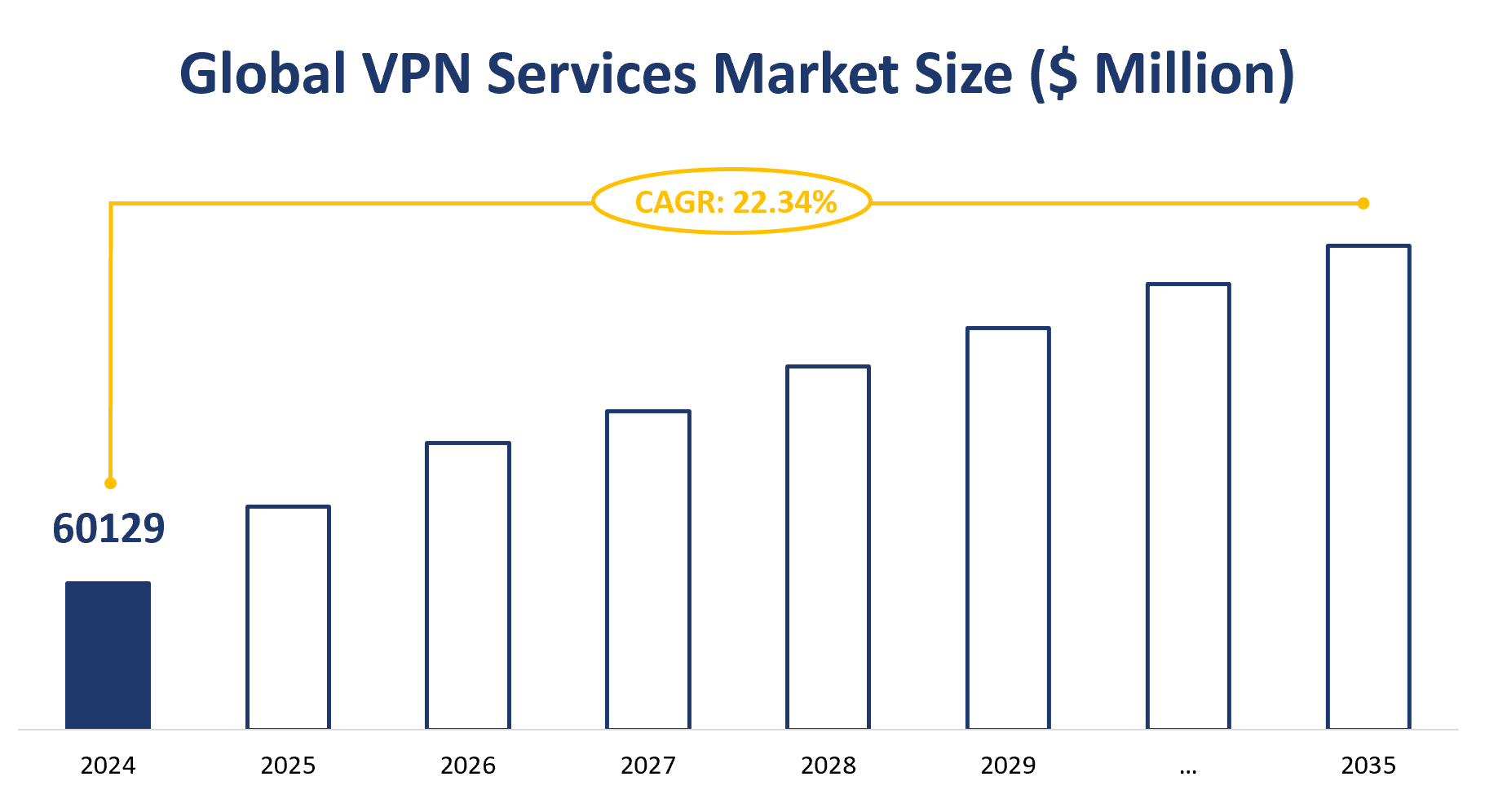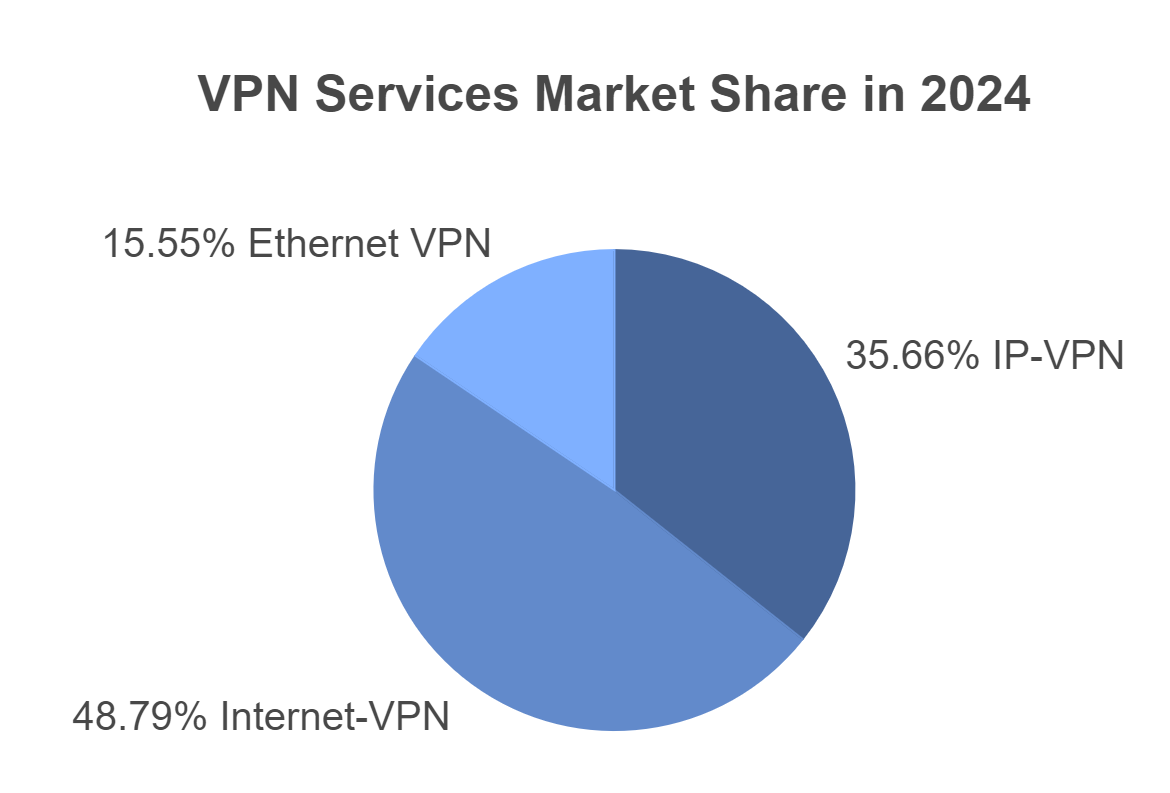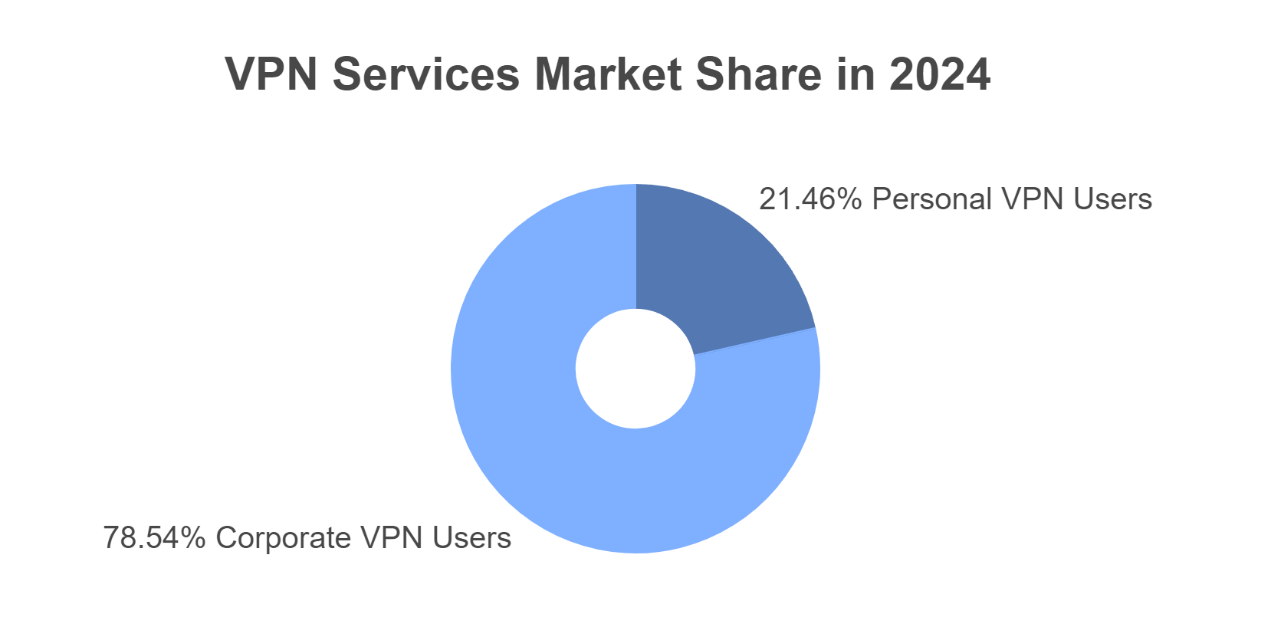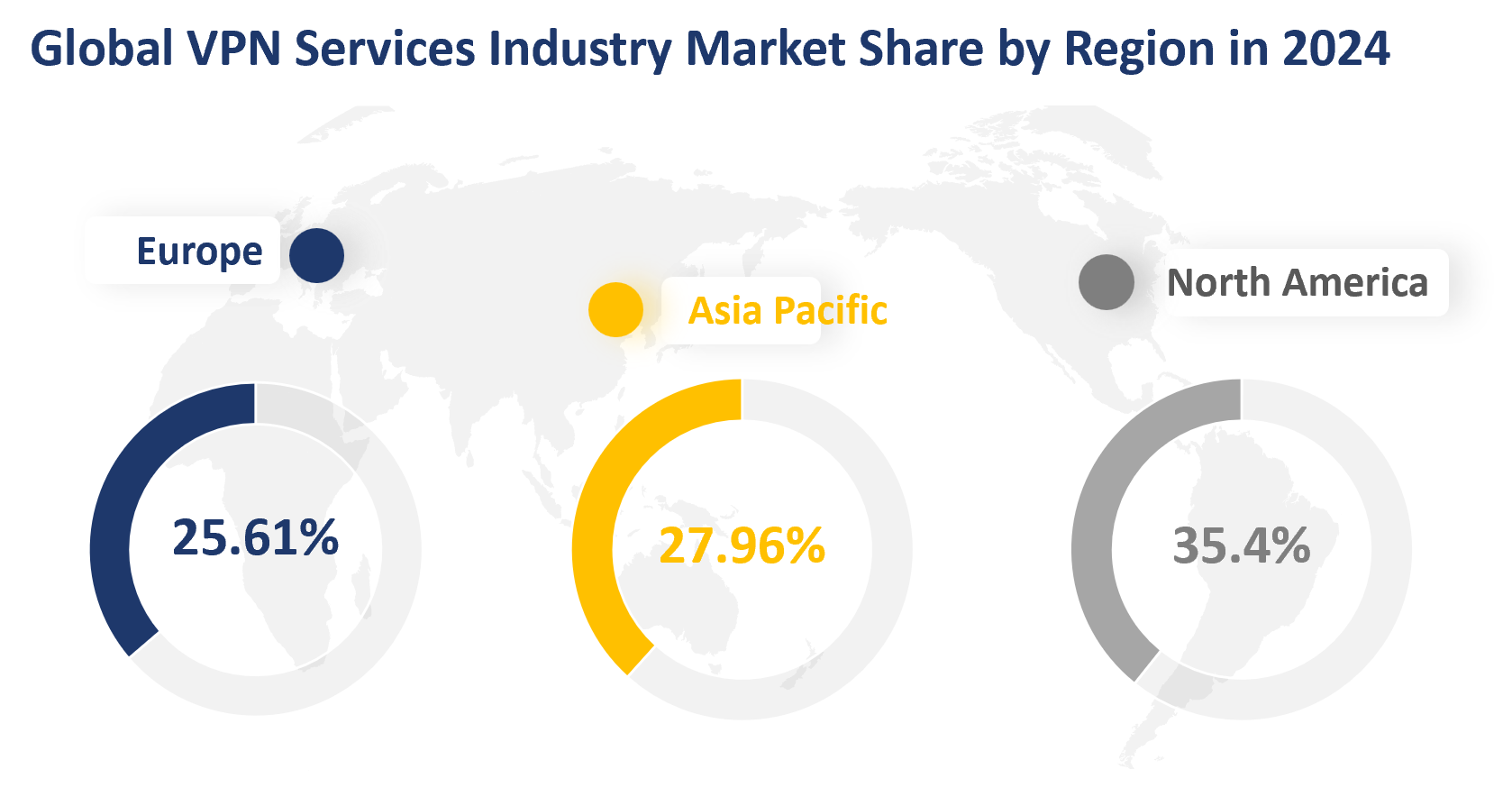1 Global VPN Services Market Overview
A VPN Services is a mechanism for creating a secure connection between a computing device and a computer network, or between two networks, using an insecure communication medium such as the public Internet. A VPN can extend a private network (one that disallows or restricts public access), in such a way that it enables users of that network to send and receive data across public networks as if the public networks’ devices were directly connected to the private network.
The global VPN services market size in 2024 is set at 60,129 million USD, with a CAGR of 22.34% during 2024-2035, indicating a robust expansion. Such a high CAGR is indicative of strong demand and potential for VPN services, driven by factors such as the rising number of internet users, growing concerns over online privacy and security, and the increasing need for secure remote access to corporate networks.
Figure Global VPN Services Market Size (M USD) and CAGR (2024-2035)

2 The Dynamics of VPN Services Market
2.1 Driving Factors
Table Driving Factors
Item | Description |
VPN Services has application advantages | The physical private network is generally built using a physical dedicated line, which is a closed intranet, and is generally provided by basic telecom operators. As an important part of private network products, physical private network is suitable for customer groups in specific industries, such as the military and other highly confidential industries, and traditional physical private networks must be used. However, most enterprise customers need more flexible, efficient, reliable, manageable, and cost-effective intranet systems. Therefore, most enterprise customers prefer to use virtual private networks. Compared with physical private network, VPN Services provides customers with customized products based on the backbone network of mesh full interconnection architecture. On the basis of ensuring the security close to the physical private network, it has technical advantages such as flexible networking, high network scalability, high resource utilization, and network manageability. |
The development of Internet technology promotes the growth of demand for Virtual Private Network (VPN) industry | With the rapid development of cloud computing, big data, Internet of Things, 5G and other information technologies, various industries will fully show the trend of “digitalization”. The Internetization with cloud computing as the core and full connection as the carrier has higher and higher requirements for information transmission. The stability and security of traditional information transmission channels are weak, so Virtual Private Network (VPN) which helps enterprises to stabilize transmission effect and improve transmission quality is gradually developed. In the future, with the increase of branches in various industries and the wider connection between private cloud and public cloud, the demand for data transmission will gradually increase. Therefore, as an efficient, secure and controllable network service, the advantages of Virtual Private Network (VPN) will become more and more obvious, and the market demand will gradually expand. |
2.2 Market Restraints
Table Market Restraints
Item | Description |
Technical barriers | The private network industry is characterized by rapid technological progress and rapid upgrade frequency, and new development directions for technology and products often appear. At the same time, the requirements of enterprise customers for the reliability, security, confidentiality and timeliness of information transmission are also increasing day by day. Therefore, Virtual Private Network (VPN) companies must accurately grasp the development trend of industry technology and applications, and constantly develop and improve their own technology to provide services and products that meet market needs and customer standards. Therefore, there are certain technical barriers in the Virtual Private Network (VPN) industry. |
3 Global VPN Services Market Analysis by Types
In the global VPN services market revenue for the year 2024, categorized by type, Internet-VPN services are the most lucrative, generating a revenue of 29,339 M USD, which is the highest among the three categories. This suggests a strong demand for VPN services that provide secure internet access to users. IP-VPN services also contribute significantly to the market, with a revenue of 21,442 M USD. These services are crucial for businesses that require secure communication over public networks.
Ethernet VPN services, while the least revenue-generating of the three at 9,348 M USD, still play an important role, particularly for businesses looking for cost-effective ways to connect multiple sites over a service provider’s network.
Table Global VPN Services Revenue (M USD) by Types in 2024
| 2024 |
IP-VPN | 21442 |
Internet-VPN | 29339 |
Ethernet VPN | 9348 |
Total | 60129 |
The Internet-VPN holds the largest share of the VPN services market at 48.79%, indicating that nearly half of the VPN services revenue is generated by Internet-VPN services. This is followed by IP-VPN, which accounts for 35.66% of the market, suggesting a significant portion of the revenue comes from IP-VPN services as well.
Ethernet VPN, while still a considerable part of the market, holds a smaller share at 15.55%. This distribution highlights the dominance of Internet-VPN services in the VPN market, which could be due to their widespread use for personal and business internet security.
Figure Global VPN Services Revenue Market Share by Types in 2024

4 Global VPN Services Market Analysis by Applications
Personal VPN Users are anticipated to contribute 12,904 M USD to the market, reflecting the demand for VPN services among individuals seeking privacy, security, and access to geo-restricted content. On the other hand, Corporate VPN Users are projected to generate a substantially higher revenue of 47,225 M USD. This indicates a strong reliance on VPN technology within the corporate sector, likely due to the necessity for secure remote access and the protection of sensitive business data.
Table Global VPN Services Revenue (M USD) by Applications in 2024
| 2024 |
Personal VPN Users | 12904 |
Corporate VPN Users | 47225 |
Total | 60129 |
The Corporate VPN Users constitute the majority of the VPN services market, holding a substantial share of 78.54%. This dominant position indicates that a significant portion of the VPN services revenue is driven by corporate demand, which is likely due to the essential role VPNs play in ensuring secure and private access to company networks, particularly in the context of remote work and the need for data protection. On the other hand, Personal VPN Users account for a smaller, yet notable, share of 21.46%. This segment represents the individual consumers who utilize VPN services for personal reasons such as privacy, security, and accessing region-restricted content.
Figure Global VPN Services Revenue Market Share by Applications in 2024

5 Global VPN Services Market Analysis by Regions
In the global market, North America takes the lead with a significant market share of 35.4%, indicating a strong reliance on VPN services for both personal and corporate use, which can be attributed to the region’s advanced digital infrastructure and a heightened focus on online privacy and security.
The Asia Pacific region follows with a considerable share of 27.96%, reflecting the growing demand for VPN services in this region. This growth can be associated with the rapid digitalization, increasing internet users, and the need for secure business operations across the diverse markets within the Asia Pacific.
Europe holds a market share of 25.61%, which, while the smallest among the three regions, still represents a substantial portion of the global VPN market. The demand for VPN services in Europe could be driven by stringent data protection laws and the region’s commitment to digital rights and privacy.
Figure Global VPN Services Industry Market Share by Region in 2024

6 Competitive Landscape
The three major manufacturers in the global VPN services market are Cisco Systems Inc., Kape, and Microsoft. Cisco Systems Inc. tops the list with a revenue of 668.03 million USD, highlighting its significant impact and leadership in the VPN services market. Kape is a close second, with a revenue of 667.20 million USD, indicating a highly competitive market where the top two players are virtually tied in terms of financial performance. This suggests that Kape is a strong competitor, likely offering services that are well-received in the market.
Microsoft, while still a substantial player, brings in a lower revenue of 358.18 million USD from its VPN services. This figure, though less than its competitors, is still significant and shows that Microsoft is an important part of the VPN services landscape, possibly integrating these services within its wide range of technology solutions.
Table Global VPN Services Revenue (M USD) by Manufacturer in 2024
| 2024 |
Cisco Systems Inc | 668.03 |
Kape | 667.20 |
Microsoft | 358.18 |
In the global VPN services market, Cisco Systems Inc. claims a market share of 1.13%, reflecting its established position in providing comprehensive networking and cybersecurity solutions, including VPN services. Kape, with a market share of 1.12%, is not far behind, indicating a competitive stance and its significant contribution to the VPN market. The proximity of Kape’s market share to Cisco’s suggests a tightly contested segment within the industry. And Microsoft, a broad-based technology company, holds a market share of 0.61% in the VPN services market. Although this is the smallest share among the three companies listed, Microsoft’s role in the VPN space is still considerable, likely offering integrated VPN services as part of its extensive security and productivity tools.
Table Global VPN Services Revenue Market Share by Manufacturer in 2024
| 2024 |
Cisco Systems Inc | 1.13% |
Kape | 1.12% |
Microsoft | 0.61% |





